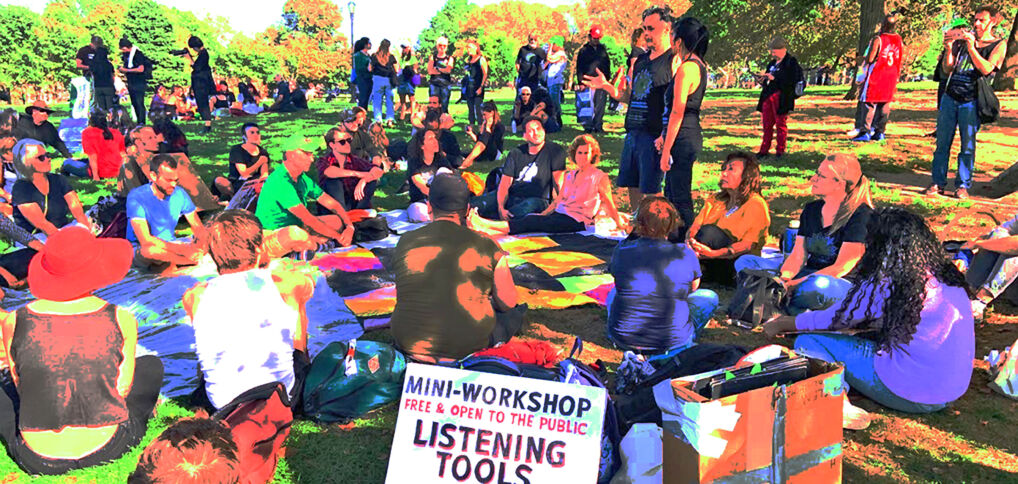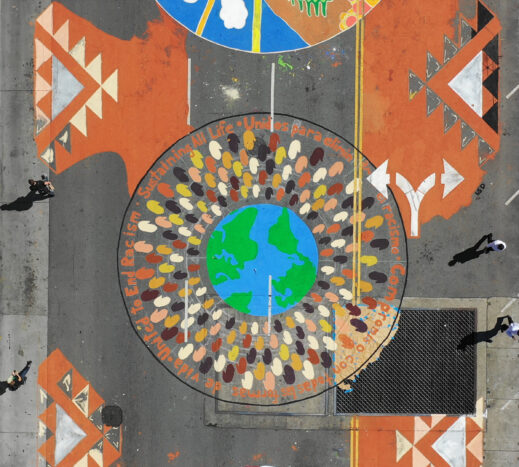
View this resource
View this resource
as a PDF >>
View this resource
in Arabic >>
View this resource
in Chinese >>
View this resource
in French >>
View this resource
in Italian >>
View this resource
in Spanish >>
in Arabic >>
View this resource
in Chinese >>
View this resource
in French >>
View this resource
in Italian >>
View this resource
in Spanish >>
In order to be effective, resilient, clear-thinking activists who stay motivated, we need to have a safe place where we can express the many emotions that come up for us. Listening circles can be such a place. In listening circles, we can release painful emotions and heal from past and present experiences that are the source of the hurts. Listening to each other in a structured way, even for two or three minutes each, can also prevent disagreements between activists from becoming divisive. Listening circles can be “popup circles” that are quickly organized during an action to encourage the activists and clarify their thinking. They can also meet regularly to strengthen and unify the participants and the movement.
THE CLIMATE EMERGENCY AND EMOTIONS
Climate breakdown has already caused severe damage. It has led to many deaths and the extinction of many species. It causes wildfires, floods, droughts, sea level rise, extreme storms, and disease. It is having an increasing impact. This can be an overwhelming reality to take in.
As activists we have chosen to face the truth about the climate and about climate injustice. We know that working-class people, poor people, Indigenous people, people of the Global Majority*1, subsistence farmers, and the whole of the Global South are the most affected by global warming although they have done the least to cause the problem. We know that over centuries the Global North has enriched itself at the expense of the Global South and that resources are still being transferred from poor to rich countries. This happens by means of interest payments on loans, exploitation of cheap labour, resource-stealing dressed up as trade, and more. Governments show little political will to solve the climate emergency and associated injustices.

It is common to feel a range of emotions about the situation—guilt, rage, grief, deep discouragement, terror, hopelessness, desperation, or a mixture of all of these and more. Those who take action on the climate emergency often feel even more, including despair, exhaustion, contempt for those who oppose us or don’t seem to know or care, frustration, and confusion.
Facing up to the climate emergency can also remind us of painful things that happened to us in the past. Feelings from having been mistreated or oppressed affect how we feel about and react to the climate emergency. This “emotional baggage” gets in the way of finding and acting on our clearest thinking.
IGNORING OUR FEELINGS AND JUST CARRYING ON
It doesn’t always work to keep putting our feelings aside. When we ignore our strong feelings over time, it can become difficult to stay motivated. We may become cynical or numb, apparently unmoved by each new piece of bad news. We may feel and sound superior to people who don’t know the dangers, or who believe politicians’ lies. When that happens, other people notice our feelings of superiority and may reject whatever we say. Sometimes we grimly throw ourselves into joyless activism, which is not an attractive model. Our unreleased, pent up feelings can undermine our hope for the future. They can make it hard to connect with each other and to get joy from being part of a powerful movement for change and justice. We need to work free from our numbness. We need to be able to express what we feel and think without worrying about upsetting the people listening to us. We get to do this in listening circles.
THE IMPORTANCE OF LISTENING CIRCLES
Simply talking about our feelings can take the sting out of them. In ordinary conversations we are often waiting for a space to start talking. In listening circles, everyone gets a turn for the same length of time, including the leader. This means we can relax and listen wholeheartedly, knowing our turn will come.

Sharing our feelings and listening to others’ helps us realize we are not alone. When someone else is listening and caring without an agenda of their own, we are able to release feelings from having been hurt. Then we can often notice that some of our previous perspectives were limited or inaccurate, and we have new thoughts. If we use the process regularly, we become more aware of ourselves. We are more able to connect with and appreciate others. We can work out what we want to do and act more effectively. We recover more of our courage and hope.
In listening circles, we get a picture of how much we have in common with others. We also get to hear about our different backgrounds, situations, and perspectives. What we learn from this can help us build a unified, inclusive movement.
WHAT HAPPENS IN A LISTENING CIRCLE
Listening circles use a simple process. They are most effective when they are led by someone who is thinking about how to make the process work for everyone. In Sustaining All Life/United to End Racism (SAL/UER) workshops we offer tools for doing this.
The facilitator explains that in each person’s turn they can talk about whatever they need to while others listen without interruption or judgment. Participants are encouraged to welcome their own and others’ talking, crying, laughing, sweating, trembling and indignation. Being listened to with full attention frees our minds to do the internal work that is needed. After releasing our painful emotions we tend to see reality more clearly, including the reality about ourselves and others.
In SAL/UER workshops we discuss the uses of listening circles, guidelines to make them safe, confidentiality agreements, and speaking order to ensure that people whose voices have been silenced get heard. We mention difficulties that may arise and how to handle them. Participants practice listening to each other and share how it went. The workshop is followed by a listening circle where participants have a longer opportunity to listen, be listened to, and heal.
1* The peoples of Africa, Asia, the Pacific Islands, the Caribbean, and Latin America, and those descended from them, and Indigenous people, are over eighty percent of the global population. These people also occupy most of the global land mass.
Using the term “Global Majority and Indigenous (GMI)” for these people acknowledges their majority status in the world and interrupts how the dominant (U.S. and European) culture assigns them a minority status.
Many Global Majority and Indigenous people living in dominant-culture countries have been assimilated into the dominant culture—by force, in order to survive, in seeking a better life for themselves and their families, or in pursuing the economic, political, or other inclusion of their communities. Calling these people “Global Majority and Indigenous” contradicts the assimilation.


